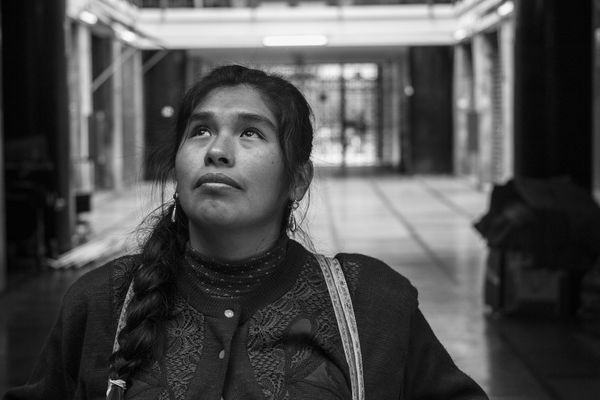 |
| Song Without A Name Photo: Beatriz Torres |
When her newborn baby is stolen by health workers who pretended they were providing charitable care, Georgina (Pamela Mendoza), an indigenous Peruvian woman living in poverty, is ready to do anything to get her back. The odds are stacked against her until she meets journalist Pedro (Tommy Párraga), who is willing to work with her to expose the truth. This is Song Without A Name (Canción Sin Nombre) and it made a huge splash internationally, making director Melina León the first Peruvian woman ever to have her work screened at Cannes. Last week, as it became available in the UK, I discussed it with Melina, beginning by asking about the true story behind it.
“Yeah, it was inspired by a thing that took place in 1981. It happened to be there, the first major case in the headlines of the newspaper La Republica. And my father used to be a journalist there. And he was part of the investigation about this. These babies got either bought or stolen from...” she hesitates. “It wasn't really planning to give birth, it was daycare. In reality I made that part fiction, because also they were taking babies from the major hospital in Lima - it's called the Children's Hospital. So they were going there as social assistance, looking for mothers who were in conditions of poverty, and they were convincing them to just give away their kids. They have many, many forms, to take these kids.”
 |
| Melina León working on Song Without A Name |
In some cases, she adds, it was just like in the film, and they were being stolen.
We talk about the many roles she played in bringing the story to the screen: writing, directing, editing and producing. She says that this was important to her because she wanted to link different themes within it and connect what was happening to other forms of violence. “I wanted to speak about violence against the LGBT+ community, for example. In real life, this character [of the journalist] is inspired on my father, but he wasn’t gay, so I made it a gay thing. Same thing, I wanted to speak about the worst part of the huge crisis that we experienced during the Eighties. But the worst part was the end of the decade. So I wrote the story to place it at the beginning of this so that we we can have this environment that allows us also to - briefly, but I think, for me, it's important – to speak about the influence of Shining Path in those days.“
There's a lot in the film about racial issues in Peru and about indigenous people and how they're treated.
“Absolutely. Absolutely. There is, I guess, in terms of filmmaking, a great issue of representation. It's not only in Peru but the entirety of Latin America.”
She references Roma and Diary of A Chambermaid alongside her own film, as examples of indigenous people becoming visible in cinema, and notes the surprise that this has caused. “It’s great, but why it should be surprising? We are the majority. And I consider myself as an indigenous descendant. We are the majority of people. So what what is strange is that we didn't have those things before.”
I congratulate her on the amazing performance that she elicits from Pamela Mendoza.
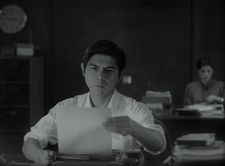 |
| Tommy Párraga as Pedro Photo: La Vida Misma Films |
“Well, thank you so much. Yes, she’s just an incredible actress, and talented, but she didn’t act in any film before or in any kind of conventional theatre. She had done some training for physical theatre. She showed up to the casting knowing already how the body can work in motion, everything that it can do for your performance. She already had that. So it was a matter of just watching films with her.
“I searched for an unknown actress because I knew that if somebody that had the opportunity to be trained as an actress and had a career as an actress, it's not possible that an indigenous person is going to have this. So I went to the outskirts of Lima, to the most impoverished places, and searched there in the local theatres that they have, for somebody who had had a life that resembled the life of Georgina, so that she could tell me how it feels. So that she could tell the audience how he feels. And she did.
“Whatever we can assume as privileged, middle class people, we can imagine but it's not the same as to live through this. So she told us.”
The film makes a lot of use of traditional music, which helps to establish the background and helps us to relate to Georgina. It’s also important, Melina explains, to showing the positive side of life in such communities.
“There’s this idea that the people are sad or tragic, right? Not that our conditions are complex and rich in many ways, and beautiful. And so it was important for me to show that too, so you get a more rounded idea of the characters. They can create the beauty, they are part of a tradition. And of course, this tragedy happens to them, and then the movie is more or less how they deal with it. Then the state makes it even more horrible. You can say, in a way, that the film does not even begin when the baby gets stolen, but what happens next is perhaps the most terrifying.”
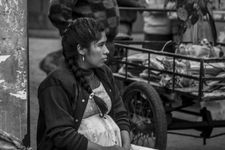 |
| Pamela Mendoza as Georgina Photo: La Vida Misma Films |
But then we also see Georgina's strength, I note, and that helps people to relate to her.
“Yes. We see her strength, her skills, her resilience. Her fight for their baby, for her rights. And yeah, her capacity to resist violence.”
So why shoot the film in square format, and in black and white?
There were many reasons, Melina says. “ We were searching for a style. The film is so sad that I thought it needed a little bit of a balance. Like when I was writing it I felt that it’s I don't know where to go with it. But when Pedro became gay – in the first draft, he was not - then I saw some balance. I saw some visions of light, hope.
“It was the same thing with the images. To go for a too straight forward look would perhaps make it unbearable to watch. So I thought maybe we should bring the graphic quality of black and white. It’s going to allow us to watch the film, to see the ideas behind it because we're going to feel the pain, that's for sure, and I want people to feel these emotions. But also there is a mystery in the black and white. Also there is an mystery in this topic. I don't understand why people are capable of dehumanising others to this levels. I don't understand that. And I think black and white allows me to visually ask these philosophical questions, because he has an abstract quality.
“That's one thing. Perhaps the other thing, more concrete, is that the newspapers were published in black and white is those days and this story comes from the newspapers. So I thought it was a nice echo of that. And the square format is also doing something. It’s a humble format and the story is about humble people that are not given the opportunity to have a horizon, to see a future.”
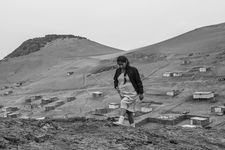 |
| Living below the horizon Photo: La Vida Misma Films |
I ask if that also affected the way Melina approached showing us the landscapes in the film. Georgina lives on the slope of a mountain and there always seems to be something up above her, so she never gets a clear horizon.
“Yeah. From the beginning from the script, we we really talked about that with advisors and people who were kindly giving their notes on the script, and they were saying yes, if a baby is stolen, maybe it’s usually symbolising the future. So that means you didn't have a future in that country...We all felt in those days, there was no place for us in this country.”
How has the film gone down in Peru?
“We were only able to show it in the Lima festival,” Melina explains. “We couldn't show it more because of Covid. We wanted it to première in April.
“I think people are really moved by the fact that I'm the first Peruvian woman that got accepted in the Cannes Film Festival. They are very curious to see. And also because of the international attention. So unluckily, I don't think we're going to be able to do all the theatres because our theatres are closed. I think that's going to be for next year, but they're going to have a streaming première first and then we'll go to some places to do some speciality screenings.”
How does she feel about the international attention? Did she ever expect anything like that?
“No, I didn't. I didn't expect he was going to be this crazy. It's great,” she smiles. “It took me a while to understand it because it's my first film so I didn’t know how Cannes worked. But after that experience, I think you learn a lot from that festival and then everything that comes later resembles that. I feel more comfortable now with all the attention and I'm just very proud of them [the cast and crew]. It’s opening doors for them just like some filmmakers opened doors for me.
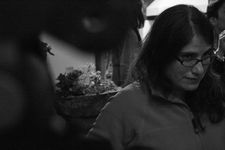 |
| Melina León Photo: La Vida Misma Films |
“It's not like the they call a co-producer and they ask them to produce my film. But I think it’s mental doors that get opened. You have a voice that says ‘You’re Peruvian and therefore your film is not going to be interesting for the world.’ Then Claudia Llosa makes a film and it turns out it’s interesting to the world. Then you think you're you don't come from upper classes so you're not never going to make it, and then there's a filmmaker like Héctor Gálvez, who made the film Paradise, who is not upper class, and he opened a door like that, and I think I am opening mental doors for many women filmmakers.
So finally, what is she planning to do next as a filmmaker?
“I just want to continue experimenting. I want to make films that challenge the audience so I want to make documentaries mixed with fiction. The next one is in Cusco. I'm very interested in the process of creation. It's a story that books about the relationship between artisans and art, and what’s art. In a way it’s challenging the European notion of art. That challenges me, and that’s a film that will be more developed in the third film that I want to make, in New York.”





















